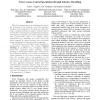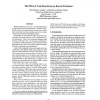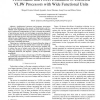66 search results - page 11 / 14 » Techniques for extracting instruction level parallelism on M... |
HPCA
2003
IEEE
14 years 7 months ago
2003
IEEE
With the constant advances in technology that lead to the increasing of the transistor count and processor frequency, power dissipation is becoming one of the major issues in high...
HPCA
1998
IEEE
13 years 11 months ago
1998
IEEE
Dependences among loads and stores whose addresses are unknown hinder the extraction of instruction level parallelism during the execution of a sequential program. Such ambiguous ...
SASP
2008
IEEE
14 years 1 months ago
2008
IEEE
Different approaches have been proposed over the years for automatically transforming High-Level-Languages (HLL) descriptions of applications into custom hardware implementations. ...
IEEEPACT
2000
IEEE
13 years 11 months ago
2000
IEEE
Branch prediction accuracy is a very important factor for superscalarprocessor performance. The ability topredict the outcome of a branch allows the processor to effectively use a...
SAMOS
2004
Springer
14 years 1 days ago
2004
Springer
— Architectural resources and program recurrences are the main limitations to the amount of Instruction-Level Parallelism (ILP) exploitable from loops, the most time-consuming pa...



